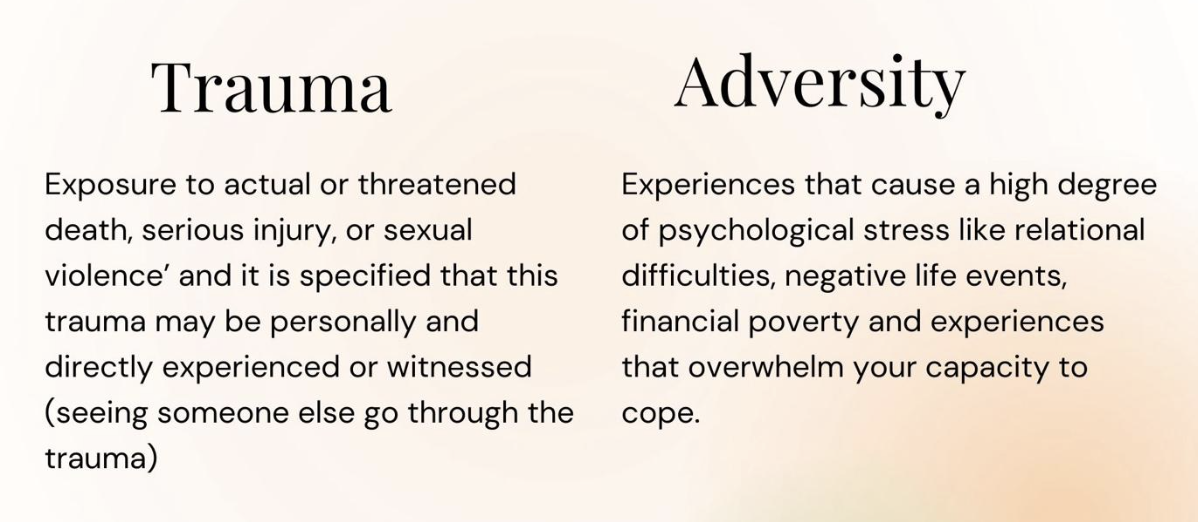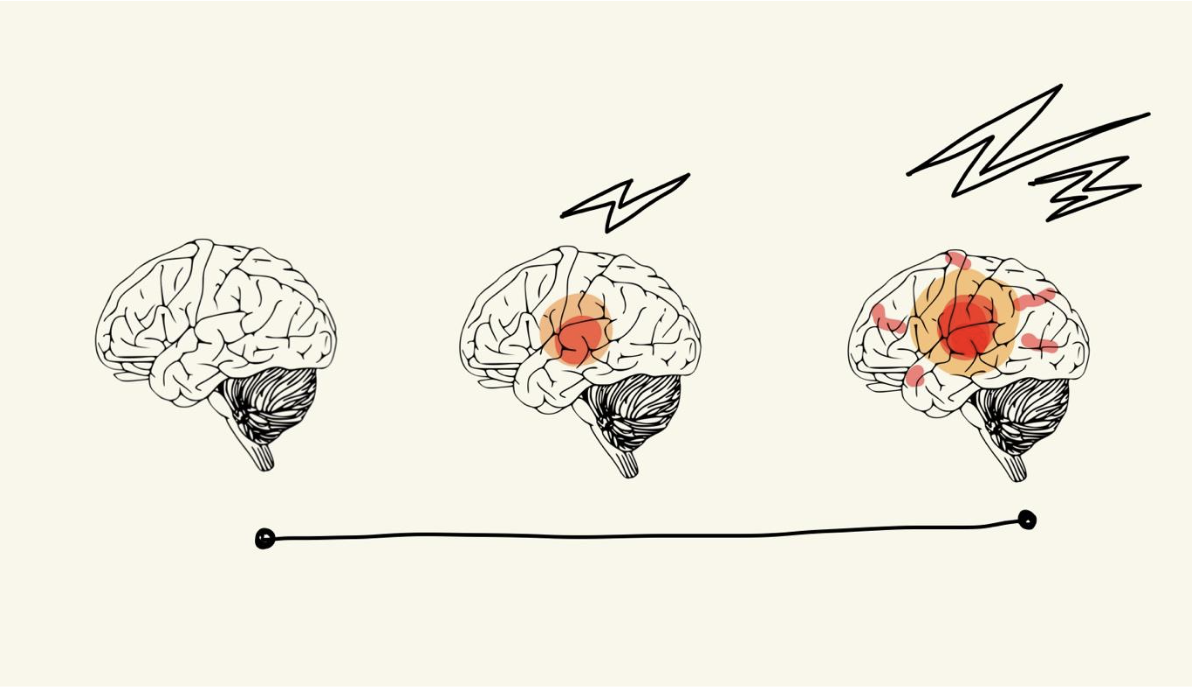What Actually Is Trauma? Understanding the Difference Between Trauma and Adversity
Jul 29
/
Dr. Sula Windgassen
The word trauma is one regularly used nowadays in pop psychology, sometimes it can be used casually to describe minor day-to-day annoyances, but in a clinically it is referring to an individual experiencing a deeply distressing or disturbing experience that has a lasting impact on them. So what actually is, what constitutes trauma and are there some experiences that are adversity as opposed to trauma?
‘I don’t think I have trauma’
This is something many people have said to me when I’m exploring what has brought them to consider therapy with myself or my team. It is often followed by a ‘but’.
“But childhood wasn’t easy"
“But there was a lot of stress growing up”
“But recently health experiences have felt traumatic”
There often is a question mark in the relaying of these truths. ‘Does that count as trauma?’
It is interesting to me, as a psychologist and trauma therapist (using EMDR and trauma focussed CBT), how the concept of trauma has garnered awareness almost to the degree that any adversity that doesn’t classify as trauma, isn’t worthy of mentioning. There’s an apology almost, in attending therapy if you haven’t had trauma.
So - what is trauma exactly?
Trauma, as conceptualised in the field of clinical psychology and psychiatry, is generally based around the definition of trauma used for diagnosing post traumatic stress disorder (PTSD). The experience of trauma, necessary to receive such a diagnosis is defined as ‘exposure to actual or threatened death, serious injury, or sexual violence’ and it is specified that this trauma may be personally and directly experienced or witnessed (seeing someone else go through the trauma)(1). This is a ring-fenced conceptualisation, that we call trauma ‘with a capital T’ in psychological practice. It is so defined partly because these such experiences are the ones that tended to elicit the bodily changes that occur in PTSD. I.e. an extreme stress response.
There is a broader definition of trauma (‘little t trauma’) that is used to describe experiences of relational difficulties, life stressors and experiences that cause a high degree of psychological stress. Financial poverty, divorce, sudden job loss. All of these things may classify as ‘little t’ trauma.
And yet, the distinction between trauma and adversity can be hard to decipher across these experiences. For example in chronic health issues and illness, there are often events, symptoms and uncertainties that threaten serious injury/bodily harm or even death. Chronic illness therefore can be full of trauma, and yet those who experience chronic illness sheepishly wonder to me whether they ‘deserve’ to use that word to describe their experiences.
Why does it matter what is trauma and what is not trauma?
The research suggests that semantics around trauma count for a lot in terms of what symptoms you end up experiencing. ‘Concept creep’ refers to the broadening out of a meaning of a term to include all sorts of related concepts. Concept creep can mean the terms like ‘trauma’ are diluted to include less severe instances of the concept. Research has suggested that concept creep can end up trivialising serious harms as extreme phenomena are grouped with genuinely less serious ones (2).
This is like, for example, someone with endometriosis-related pain being dismissed because that pain is seen as just a variation of normal period cramps. Concept creep can also pathologize normal experiences, turning understandable emotional experiences into a diagnosable condition. This can create labels people identify with that actually increase psychological vulnerability. In fact, a 2021 study showed that people who held a more expansive view of trauma, were more likely to experience lasting negative psychological effects after watching a disturbing video (3). In short, labels can lead to the unconscious embedding of problems (4).

Although there are not necessarily always definitives to determine if whether something counts as trauma or not, attempting to at least broadly differentiate trauma from adversity can prevent the harms of concept creep. If ‘trauma’ is reserved for the experiences of extreme threat, then adversity can be used to describe the whole range of experiences that can also be severely distressing and biology altering. Adversity can be one adverse event or period (for example suddenly forfeiting on your home or losing a friendship).

The continuum from adversity to trauma can be considered a biopsychosocial one. As you move towards trauma from adversity, the extremity of the social experience increases, as does the degree of psychological distress/overwhelm, as does the degree of biological disruption. That’s not to say that the biological impact of chronic stress from adversity can’t match that of trauma, but with chronic stress, the extremity is accumulated over time, whereas one traumatic incident can be enough to dysregulate systems.
Understanding the difference between trauma and adversity isn't about gatekeeping who deserves support - it's about recognising how different experiences affect our biology and psychology. Whether you've experienced 'big T' trauma (life-threatening events) or 'little t' trauma (chronic stress and adversity), both can significantly impact your nervous system and overall health. For those living with chronic conditions, many health experiences do constitute genuine trauma, involving threats to bodily safety and overwhelming stress responses.

Free webinar: How your childhood changed your health
Body Mind Connect will be hosting an upcoming webinar that will explore the profound connection between childhood experiences and your health in adulthood, deep diving into how early stress and trauma create lasting changes in both brain and body. Our founder, Dr. Sula Windgassen, will draw on both research and clinical experience, and guide you through understanding how your early experiences can influence your physical and emotional wellbeing.
We are here to help
If you're questioning whether your experiences with chronic illness or ongoing health challenges constitute trauma, you're not alone. Our research-informed approach recognises that chronic conditions often involve genuine traumatic elements - from frightening symptoms to medical gaslighting to the ongoing threat of unpredictable flare-ups. Within our supportive community, you'll find others who truly understand these experiences and learn evidence-based techniques for processing difficult health journeys. Whether you're dealing with the aftermath of specific medical trauma or the cumulative stress of chronic adversity, our programme helps you understand how these experiences have affected your nervous system and provides practical tools for healing both mind and body.
About Dr Sula Windgassen, PhD
Dr Sula is a Health Psychologist, Cognitive Behavioural Therapist, Eye Movement Desensitisation & Reprocessing (EMDR) Therapist and Mindfulness Teacher. Trained at King's College London & publishing papers on the use of psychology to improve health and whole-person wellbeing.
Featured links
Copyright © 2025

